Jul 3, 2019
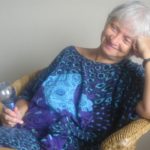
I met Mary Anne Hilker in 1980, almost forty years ago. We began as colleagues on a three-year grant to study child support enforcement. We shared an office, as well as the hard work of carrying out the overblown, poorly-designed research. In an organization dominated by men we shared outrage and laughter, as well as stories of her marriage and my ceaseless honey-hunt. In the course of our long friendship we have shared a great deal more.
When my son was twelve he went with my boyfriend on a weekend fishing trip in the Gulf. In the middle of the first night the boat began to leak, and my son and the four men spent the next ninety hours clinging to the overturned boat, without food or water, subject to rain, lightning and the merciless sun. Shortly before the Coast Guard helicopter rescued them on Tuesday evening, one man died. Meanwhile, my own weekend was carefree; my ordeal didn’t begin until their failure to return on Monday night. (read Mother/Ocean, my poem about the accident. https://elizabethmccullochauthor.com/?s=Mother%2FOcean )
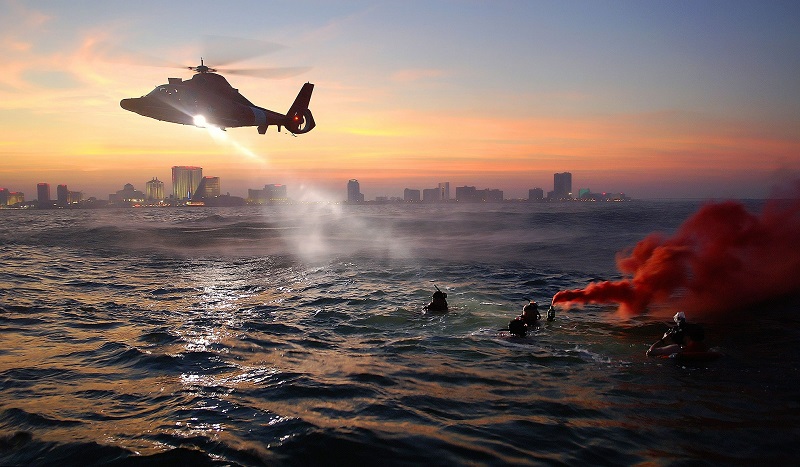
image: uscg.mil
My memories of that time are mercifully fragmented and confused. The small hospital in Crystal River was overwhelmed by four victims at once. Recently Mary Anne reminded me, as we reminisced about nasty motels we had known, that she had stayed with me in Crystal River until my boyfriend was discharged from the hospital, in a motel that earned the Nastiness Blue Ribbon.
Mary Anne and Larry didn’t have children. There is an unbridgeable chasm of understanding between people with children and people without. I’ll never forget, when I was complaining about some outrageous prank by my then 16-year-old son, how Mary Anne asked why I didn’t just kick him out. She understands now. In their early fifties the Hilkers became foster parents and took in two adorable and accident-prone little boys. Then they got an eight-year-old boy, followed a year later by his newborn sister. The agency sent the boy elsewhere, but the Hilkers adopted the girl a year later. That was eighteen years ago.
Meanwhile, my own former foster daughter had a baby, who lived with us at intervals until we adopted her at age seven. The two girls consider themselves sisters; as my granddaughter Amanda says, “She’s known me since I was born.” I can see them, ages four and two, toasting marshmallows in the fireplace, covered with white goo, particularly fetching on Amanda’s dark skin. I see them parading around the living room, Ariel in her mermaid costume, Amanda in a yellow Cinderella dress. Sharing a cabin at Roosevelt State Park in Georgia, roller skating around the lake, marshmallows again at the campfire.

FDR State Park, Georgia
Squabbling, estranged, coming back together closer than ever. And I see me and Mary Anne over the years sitting in our special corner with glasses of wine, sharing the obsessive joys and worries of parenthood. Schools. Bullying. Boys. Our hopes and fears for their futures.

We didn’t only share troubles. We traveled for pleasure, to New York and New Orleans, Denmark and England. In London and Bath we wandered through gardens and recalled together all our favorite English novels. On the city bus in Copenhagen we discovered that, contrary to all the guidebooks, not everybody in Denmark speaks English. In our little B and B, with our internal clocks askew, Mary Anne had to ask me at 2AM to please stop humming. We took the train ferry to Aarhus, and left our train below to sit on the deck, enjoying the breeze while I sipped aquavit, which we had discovered in Tivoli Gardens. Mary Anne went on ahead, but when I returned below as the boat docked there were THREE trains, and I had a tipsy time finding our train, our compartment, and Mary Anne, who was wondering if she’d ever see me again.

Tivoli Gardens at night. Image:guidedanmark.org
In New York we stayed with my sister Luli, in her cramped third-floor apartment on Eighth Avenue and Fourteen Street at the edge of the Village. Delicious food, long walks, hilarious, intimate talks. I was a little jealous of the rapidly-growing friendship between Mary Anne and Luli – the three year old in me cried, “She’s MY friend.”
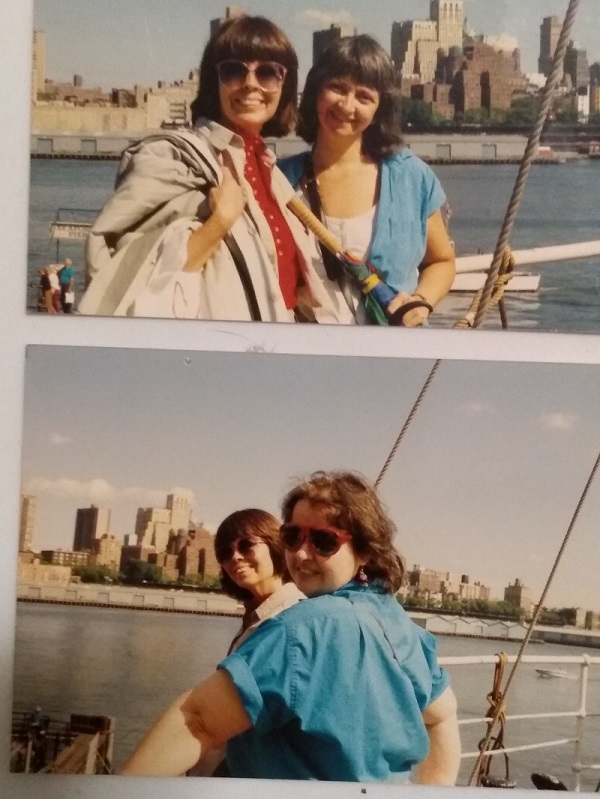
My friend or Luli”s?
Nevertheless, when Luli visited me in Gainesville I would arrange visits for just the two of them . And there was the memorable occasion when Luli, Joe and I lunched at the Hilkers’ with the two adorable boys. The three-year-old finished his slice of pizza and promptly threw up what seemed like a quart of vomit all over the food. It was a once-in-a-lifetime experience for Luli, who had always proclaimed her aversion to children. Mary Anne and I still laugh about the look on her face.
My long honey-hunt finally came to an end when I met Joe, and after four years we married. Our two families gathered the night before the ceremony at Mary Anne and Larry’s, in the back garden – there are few places lovelier than a Florida garden in October. Mary Anne and Luli prepared numerous side dishes and desserts, and we celebrated and feasted on burgers and hot dogs grilled by my nephews, two bushels of oysters, Mary Anne’s salads, and Luli’s desserts.
Mary Anne and I usually exchange birthday and Christmas gifts. She has given me memorable T-shirts, which I reluctantly discard when they are faded and torn.

I can’t bear to throw this one away
At Christmas I usually make her a tin of pecan brittle. She shares it with her family, but keeps a secret stash for herself. Sometimes we give books or notecards. Luli drew wonderful notecards. She hoped to sell them and make her fortune, or at least enough to support her cats. I bought them, and her friends bought them, but as with most creative enterprises, income was less than outgo, and she was left with an accordion file full of samples, which she generously shared with me in her last year. Now Mary Anne and I each have a collection. We both find it almost impossible to send them off, as there will never be any more.
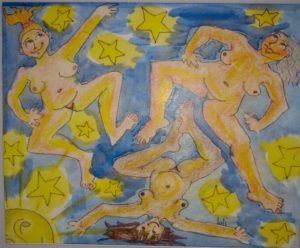
a Luli card
The hardest part of aging is the relentless succession of losses. Mary Anne’s sister died. My brother died. Her mother died. Luli died. While Mary Anne keeps her troubles to herself and refers to them only glancingly, she is my confidante, and though I come from a long line of stiff-upper-lippers, at times I have fled to her garden or our corner in the living room and poured out my woes. I don’t think I was much comfort to her as her family dwindled, but she sustained me through the months of Luli’s dying.
Like me, Luli was a writer, and we cheered each other on. She had instant success with her first book, a lyrical story of a young girl who finds a glowing egg in Central Park. { Luli’s book https://www.amazon.com/Falcons-Egg-Luli-Gray/dp/0395711282 } She found an agent on her first try and, shortly after, a publisher, and the book was a Newbery Notable. She dedicated it to me, “For my sister Elizabeth McCulloch, who led the way.”
Mary Anne read the original version of my first novel, Dreaming the Marsh. She loved it, though she dismissed one character as a stereotype: another Black woman who cooks and says wise things. I was appalled and amused; that character has grown considerably since then. I waited thirty years for the novel to be published, and thirty years to show Mary Anne the dedication, “To Mary Anne Hilker, friend and first reader.” I kept my secret all those years, and when the advance readers’ copies arrived, I found Mary Anne in her garden, and pulled the book from my purse. She was as thrilled and I was as happy as I had always known we would be.
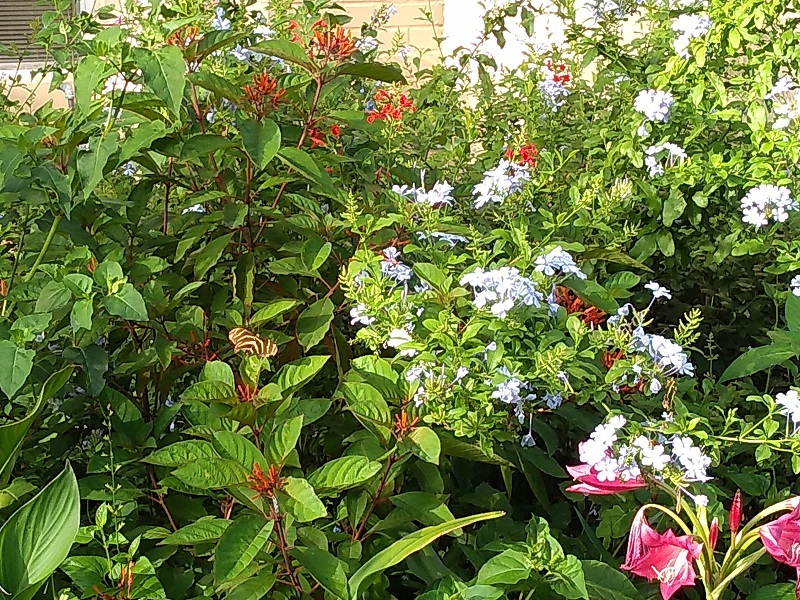
Mary Anne and a zebra long-wing were waiting for me
Mary Anne is a voracious reader, and a gifted gardener. Now retired, with her daughter grown, she can focus on books and the garden. She also volunteers at the Marjorie Kinnan Rawlings homestead in Cross Creek, dressing in a 1940’s housedress, and taking small groups through the house and around the garden and orange grove, sharing everything she knows. She knows a great deal, as she has read everything there is to be read about the author and her works.
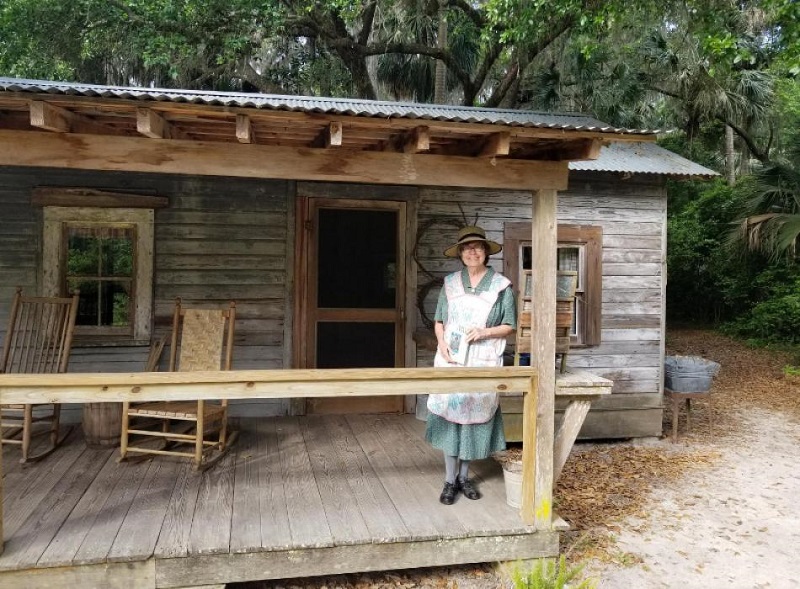
Mary Anne at the Rawlings tenant house
Rawlings, though a non-native, wrote about Florida as well as any of the greats. She shared the prejudices of her era, as I surely share the prejudices of mine, but she is part of this state’s literary story. Her very modest cracker house, with the separate kitchen, is arranged as it was. The front porch is set up for her writing, typewriter on the table, chair facing out so she could see the occasional neighbor go by on County Road 325 and smell the tea olive shrubs by the door. Only the glass of bourbon is missing.
Recently Mary Anne called to tell me that the park ranger at the homestead wanted to meet me, and arrange a reading after my book is published. There may be more thrilling news to come, but I can’t imagine what it would be – a Nobel, perhaps?
The house itself is not accessible – even if they put ramps at the entrances, the narrow doorways and passages won’t accommodate a wheelchair. But the grounds and barn are accessible. That’s where the docents give their talks, and that’s where I will be speaking.
Mary Anne and I went out to meet with the ranger, Geoff Gates, and the park manager, Scott Spaulding. We were all enthusiastic – Rawlings wanted her house to be a center for writers, not just a museum, and they had long sought a way to begin that project. As for me, I feel I am being welcomed into the long tradition of writers who celebrate Florida – its beauty and natural wonders, its peculiarities, and the ordinary people who inhabit this extraordinary place.
After the long talk about plans and possibilities, the two old friends had to celebrate, and Mary Anne knew just the place. In Citra, hidden away inside Grand Lake, a golf resort of mobile homes and trailers, overlooking Orange Lake, is The Eagle’s Nest. You would never know about it unless you already knew about it.
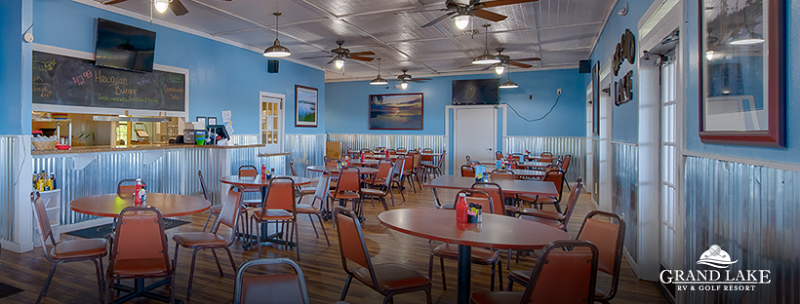
The Eagle’s Nest

Orange Lake
The menu is ordinary – fried fish, burgers, salads – but everything is perfectly prepared. I have long sought the perfect onion ring, and I found it here. The collards are as good as they get. (I love greens.) We ate too much, talked about everything, sat a long time looking out over the lake. It was our first expedition together in many years. We were celebrating my book – Mary Anne is as excited about it as I – but more than that, we were celebrating our long love and friendship.
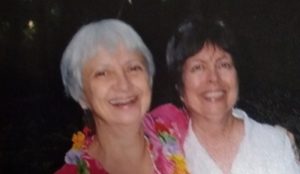
We’ve become blurry with age
May 16, 2019
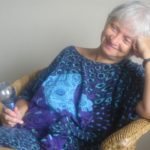
In May, Joe and I went camping at Cumberland Island, a barrier island just north of the Florida border. Although there is some private property on the island, 18,700 acres have been set aside for the rest of us. No cars allowed, just people and bicycles, and lots of wild horses.
The world has so many beautiful places; this is one of them. A boardwalk traverses wide dunes to a long, empty beach. Salt spray discourages the live oaks from growing high, and their limbs twist to reach the sunlight. Underneath are palmettos, each frond with its population of tiny green frogs with large voices.

 images: National Park Service
images: National Park Service
Only 300 visitors are allowed on the island at a time, so campsites and ferry tickets must be reserved many months in advance. There were few campers at Seacamp in midweek, and the beach near the campground was almost empty; back-country campers go to beaches farther north on the island. Loud groups of school children arrived for daytime field trips, but we didn’t see or hear much of them. They were usually leaving as we went to the beach in the late afternoon.
The entrance to our campsite curved through the trees and underbrush so it was hidden from the trail. No water spigot, but there was a fire ring, a picnic table, and a high cage for all our food and sweet-smelling toiletries. We hung our trash bag from the cage temporarily, thinking no scavengers would visit while we were in camp, but one well-fed raccoon came in boldly and chewed a hole in the bag and another jumped on the table to get to our toothpaste and soap.
On the first morning I rose at five-thirty and boiled water for my coffee. I set out my big insulated mug and turned away to fill the cone and filter with coffee, then put them on top of the mug and poured the water through. The fifteen-minute walk to the beach through the twisted live oaks, the sky just beginning to brighten, brought memories of Amanda. We took her camping at Cumberland Island when she was seven, and as she and I walked to the beach at dawn, and saw the brilliant colors through the trees, she began singing ‘Mister Golden Sun, please shine down on me.’ click

I walked across the broad empty beach past rippling tide pools to the edge of the water, and watched the sky change. The sun was soon up, but it was another twenty minutes or so before a thin gleam outlined the dark clouds on the horizon. I drank the delicious, strong coffee. In my loudest tenor I sang what I remembered of a song from my youth – ‘Sun arise, she bring in the morning…’ by a now-disgraced Australian singer. It’s an old song, a chant and a rejoicing. click (the comments following the video debate the propriety of enjoying art by bad guys)
I was purely happy, alone on the beach for half an hour, watching daybreak. Just a moment before the sun rose above the clouds, I heard someone walking up behind. I turned, and it was Joe. He hadn’t had his coffee, so I offered him my last swig. He took it gratefully, and then spat. “There’s something in it.” It was an inch-long caterpillar, boiled. It had fallen into the mug as I put coffee in the cone. I had been drinking caterpillar soup.
 Dawn post-caterpillar: still cheerful
Dawn post-caterpillar: still cheerful
We walked back to our camp along the boardwalk through the twisty oaks, past the bathhouse, down the trail. I tried not to think about the caterpillar. We met a woman and told her about it. “It touched my lips,” Joe said with horror. She answered without hesitating. “You kissed a caterpillar.” I was so impressed. When I encountered her again the next day, at the bathhouse with her husband, I praised her wonderful attitude toward life. “She finds something good to say about everything.” her husband said. He didn’t seem to appreciate this, but it put a cheerful song in my head. click
Florida beaches are too hot from morning to late afternoon, so after breakfast we walked along the River Trail through the woods. Surprisingly, mosquitoes don’t seem to be very active yet; they only troubled us for about half an hour at dawn and dusk. It was a beautiful day for walking, with a soft, steady breeze.
The trail took us to Dungeness dock, and the broad pasture where wild horses graze. When we were there with Amanda, she saw a stallion’s imposing penis, and I explained, though I feared it could make sex scarier than it already is. Now it was the height of mating and foaling season, and the first thing we saw was a grazing bay mare with a white foal suckling beneath her, a bay stallion grazing a little distance away.

I was tired from the walk, though it was under a mile, and sat on a bench watching a dozen horses grazing, rolling in the grass, trotting around, while Joe took pictures. I was reading the park brochure when Joe called, “Look up.” I searched the sky for birds, but then heard hooves, and looked across to see the stallion galloping straight towards me, followed by the mare and foal. He hadn’t read the brochure about staying 3 bus-lengths away from people. I sat frozen, nothing to be done, but fortunately he turned about eight yards from me, and the family circled the field.
 Feral horses grazing at the ruins image: National Park Service
Feral horses grazing at the ruins image: National Park Service
We walked on to the ruins of Dungeness, a mansion built by Andrew Carnegie. Joe headed to Raccoon Key, where he saw thousands of crabs swarming on the sand. I walked the mile back to the camp, exhausted and blue because my stamina is gone. As always, a song came to me, and cheered me up a bit, and I could sing freely on the empty trail.
I love camping. I like the way daily activities become a slow ritual; showers, toilets, and potable water were a ten-minute walk through the woods. I like being outside in the dark under the stars. I like playing cribbage by lantern light.

I tried sleeping in the tent, but the ground, even with the Thermarest mattress, was too unyielding for my left bad hip and my right bad shoulder, and wouldn’t make room for my butt. So I slept outside in the string hammock, and I was blissful, looking up into the sky and stars until I couldn’t keep my eyes open. The frogs sang all night and the birds began before dawn.
It was wonderful, but this may have been my last tent-camping trip. I have less energy than I used to, and I need to sleep well at night. I can still spend parts of the night in the hammock in our backyard. I can still sit outside at dawn and dusk. And I can still remember, and sing the songs that cheer me. click
Mar 30, 2019

My sister-in-law, Doris, is perhaps the most literate person I know. When someone at her retirement community invited her to join a “Great Books” reading club, she took a look at the list and realized she had read them all, except for Gibbon and War and Peace, so she declined. Recently, dismayed by the state of the nation, she is focusing on non-fiction, the denser the better (though I think she’s still taking a pass on Gibbon).
 Perhaps we should read about declining empires image:penguinrandomhouse.com
Perhaps we should read about declining empires image:penguinrandomhouse.com
She may also be the hardest-working person I know. At 81, Doris runs an editorial service, translating from German and French, editing manuscripts and helping authors find publishers. Self-employed, she is a demanding and relentless boss. On a recent visit she told me defiantly that a journal editor would “just have to wait” for her translation of an article on dementia. He had sent it to her with no warning just before she came to Florida for a week’s vacation, and she couldn’t get to it until she returned home. It wouldn’t be back on his desk until ten days after he had sent it.
I love going for walks with Doris. She can name every wildflower and tree. When she is deprived of walks by dreadful weather (they’ve had a very rough winter), she suffers greatly from being cooped up inside. Her only exercise then is yoga, Zumba, and fiercely competitive games of ping pong in the basement of her building. At the New Years Eve party, she choreographed and danced La Bamba with two other women, while her husband (my brother Don, age 91) sang. After a long phone chat with Doris I sometimes have to lie down to recover from vicarious exhaustion.
 image: josh sorenson at pexels.com
image: josh sorenson at pexels.com
It was Doris who introduced me last year to the Oxford English Dictionary Word of the Day. click It is now my daily treat. Almost all the words are new to me, and whenever I find one that delights me, I add it to a steadily growing list. Unfortunately, I can never use the words in conversation; no one would understand me (except, perhaps, Doris). Therefore, Gentle Readers, I am sharing some of them with you. Though I have shortened the definitions, if you don’t enjoy dictionaries you may want to stop here.
Some words I love for their meaning: Quob [To throb, palpitate] – such a sexy word. Cwtch (rhymes with butch) [a cupboard or cubbyhole, cuddle or hug].
Some I love for their sound: Pisculent [Full of fish]. Puckeroo [Useless, broken]. Quagswagging [The action of shaking to and fro].
 pisculent image: alesha loben on pexels.com
pisculent image: alesha loben on pexels.com
I love a few words because I never knew we needed them, and they make me laugh. Demonachize [To remove or drive monks permanently from (a place). Zedonk [The hybrid offspring of a zebra and a donkey]. And my favorite, Hippanthropy [The delusional belief that one is a horse]. Obviously, we need a new word, Zedonkthropy.
 Gainesville (GA) Times – baby zedonk at Chestatee Wildlife Preserve
Gainesville (GA) Times – baby zedonk at Chestatee Wildlife Preserve
in Dahlonega, GA
One word we clearly need is resistentialism [The theory that inanimate objects are hostile to humans], though I don’t know why they call it a theory. How do you think I got all these bruises?
Many words on my list would help me in Scrabble if I could ever remember them, but alas, I suffer from obliviscence [The state of having forgotten, forgetfulness].
I love the words that are useful in Florida summers. Summerful [Full of summer; summer-like, summery]; oam [Steam, vapor, condensation; warm steamy air, heat haze]; mafted [oppressed or stifled, especially by the heat].
 image: Anderson W Rangel on Unsplash
image: Anderson W Rangel on Unsplash
There are many words I could use if I cared to write an essay about the President. When, disheartened and without much knowledge of history, I fear that we are in a time worse than any that has come before, I now have many venerable words that apply to The Rump, and am oddly cheered to think that parlous times are nothing new:
Ampullosity [Swollen or pretentious inanity; turgidity of language, bombast]; Boation [Bellowing, roaring; a loud bellowing noise]; Jactance [Boasting; vainglorious speaking]; Ondful [Malicious; spiteful, envious]; Homophily [The tendency of people to be drawn to or seek out those they perceive to be most like themselves]; Realia [Real things or actual facts, especially as distinct from theories about or reactions to them]; Imaginarian [A person concerned with imaginary things]; Jeel [Trouble; mischief; damage. Frequently in ‘to do jeel.’]; Jabroni [A stupid, objectionable, or ridiculous man; a loser, a knuckle-head]; Badmash [A scoundrel, a rogue; a miscreant; a hooligan, a ruffian]; Wanwit [A fool].
 image: History in HD on Unsplash
image: History in HD on Unsplash
My only objection to the OED Word of the Day is that it so often turns my thoughts to The Rump. But it has also revealed to me that I am a verbarian [A person who is interested in words]. Writing this was great fun, my version of sport. (I think I am now officially old.) So thank you, dear Doris. You are indeed a walkative [Inclined to walk; characterized by walking] verbarian, and a beloved sister-in-law.
 A walk at Paynes Prairie – Joe, Liz, Don, Doris
A walk at Paynes Prairie – Joe, Liz, Don, Doris
Dec 28, 2018

We had a quiet Christmas day, just the three of us, and in the late afternoon Joe and I went to Ring Park. A blue sky, and all the trees lit by the low winter sun.

There were few visitors; we were alone on the overlook. We leaned on the rail and looked down to where a clear white-sand-bottom stream runs into the tannic waters of Hogtown Creek. We listened to each other as we puzzled through what to do about a strong-willed teenager who is stuck on a dead end road, and an old woman, her brain damaged by years of alcohol, who is facing eviction.
Then we were quiet and just listened to the woods. A bird call. A family passing on the trail – children, parents, grandparents, leashed dogs. I thought I heard a man singing to his toddler, but when I looked through the trees I saw he was alone with his dog.

You can watch a creek for a long time. The water flows through shade and sunlight over dips and rises in the creekbed; reflections shiver and shimmer. We need an impressionist’s palette and brush to capture the movement and colors: gold, brick, ochre.


I was at Murder Creek in the Oconee National Forest, watching twigs and leaves float by, when my inner voice said, “gifts of the river,” and I knew I had to take in two children who had bounced from home to home in foster care. One stayed with me almost two years, and a few years later I had the granddaughter we’re now raising.
We left the overlook and walked off the trail down to the sandy bank, stood at the bottom of the oxbow loop. We dropped leaves in the water, to carry away our anxiety and anger. We watched them twist and turn in the current, float downstream, enter an eddy and float back up, lie still in a backwater, snag on the bank. I picked up a hickory twig with six leaves – anger, love, resentment, hope, fear, grief. I threw it in, though I knew that tangle of troubles would never make it downstream.


If we waited long enough the leaves freed themselves from bank and backwater, but we grew tired of waiting and poked them free. Our granddaughter is stuck: when and how do we intervene, when do we let her find her own way? Can we believe that she will leave the backwater and move on?
Nov 28, 2018

For about 8 weeks I was sick with bronchitis. I coughed and coughed and coughed, and had no energy or stamina. I was still working on my writing, which right now consists of book reviews churned out at a mad pace, in an effort to expand my almost non-existent writers’ network.
 image:authorsguild.org
image:authorsguild.org
But after working each morning I dragged around, lay down between chores, and tried unsuccessfully not to whine and complain. Joe advised me that rather than say, “I just can’t manage to make dinner tonight,” I could simply say, “Will you do dinner?” And when I emerged from this truly annoying condition, I resolved to banish the word “exhausted” from my vocabulary.
 image: the-lazy-trader.com
image: the-lazy-trader.com
It’s been about a week since my energy returned. The first thing I wanted to do was rescue the garden. Huge amounts of spring rain followed by killing summer heat and mosquitoes had kept me away, and when finally the humidity and temperature dropped, the bronchitis hit. So everything was weedy and tangled. The wild hedge by the front walk was way over my head, and the giant bamboo was overhanging the path and slapping the roof of the pool screen.

Ever since our friend Ted gave me powerful long-handled pruning shears, I love pruning. I cut all the aspiring trees in the hedge down to chest level, and the next day cut back the bamboo. It all made a most satisfying pile by the curb, waiting to be hauled away. Alas, I can’t take a picture of it, since the yard waste truck has come and gone.
Joe’s daughter Leah was hosting her first Thanksgiving, and we were getting ready to drive to New Orleans on Tuesday when our granddaughter Amanda got sick and couldn’t go. She insisted that I should go anyway, that she’d be okay on her own. “I’m not fourteen!” she said indignantly. But I’m not leaving a 16-year-old by herself for five days, no matter how self-sufficient she thinks she is. So Joe went off and I stayed behind, both of us disappointed.
I occasionally descended into feeling sorry for myself, but I invited myself to Chris and Michelle’s for Thanksgiving dinner with a small group of good friends and Michelle’s smiling 96-year-old mother, whose failing memory has not destroyed her lively wit. The rest of the time I stayed busy with books and writing, looking into book publicists, listening to music while I crocheted hats.
 image:skinnerinc.com
image:skinnerinc.com
Thanksgiving day was chilly by Florida standards, but Black Friday was mild. After some time doing book things, I fed the birds their mealy worms, and sat in the sun cleaning up the big pots where I grow greens in the winter. The soil was still rich and black; the weeds were easy to pull. The weediest pot, filled with a gorgeous clump of wood sorrel, turned out to be the home of many large rust and black ants. Fortunately they didn’t bite. I didn’t want to kill them, and didn’t think of looking on the internet for a solution, so I put the pot in my cart and rolled it over to the woods, where I dumped it among the ferns.
 image:fmcprosolutions.com
image:fmcprosolutions.com
It took about an hour to weed all the pots. Now I had fifteen pots just begging for plants, so I went to Garden Gate nursery. To my surprise, there was only one other customer. To my delight, the nursery had just received new stock. They had lots of arugula, mustard, and chard, my three favorites, and teeny seedlings of a lettuce I’ve never seen before.



images: arugula, mustard johnnyseeds.com chard bonnieplants.com
I bought 25 baby plants, plus three small red geraniums covered with buds, to replace the thoroughly dead old geraniums by the front door. I couldn’t stop smiling all the way home. Let others stand in endless lines to spend way too much money for huge amounts of stuff on Black Friday. click I’m happy to spend my own Green Friday browsing alone through flowers and greens.

Jun 18, 2018

BOOK REVIEW: WINSTON WILLIAMS, FLORIDA’S FABULOUS WATERBIRDS
We’ve come to Delray in south Florida for Fathers’ Day with Joe’s dad Ollie and his wife Annette. Whenever we visit here, we go walking at Green Cay or Wakodahatchee Wetlands, water reclamation parks with miles of boardwalk over wetland and hammock – birds everywhere, and the occasional alligator.
 GREEN CAY
GREEN CAY
I’ve known Annette and Ollie close to twenty-five years. Annette and I, both opinionated feminists, connected very quickly. In early days with Ollie there was the slight wariness of father meeting girlfriend, warm but not knowing whether it’s a passing fancy or a new member of the family. For the first few visits conversation was hesitant. Gradually, a relationship built over dinner and dominoes, our shared love for Joe, and these walks at the wetlands.
 ANNETTE AND OLLIE
ANNETTE AND OLLIE
On one of our first walks Ollie and I fell behind, leaning on the railing, watching the birds. I saw an interesting one that I couldn’t identify. “Do you know what that is?” I asked. “It’s a bird,” he said. As soon as we returned to Gainesville I bought an Audobon Field Guide, inscribed it in front ‘To Ollie from Liz. It’s a bird’ and mailed it off.
 NOT A BIRD.
NOT A BIRD.
Image: Asbruckman at commons.wikimedia.org/w/index.php?curid=3877883
Now, twenty-odd years later, Joe has found a much better gift for the indifferent bird-watcher, Florida’s Fabulous Waterbirds: Their Stories by Winston Williams.

He got it on the last day of the Friends of the Library Book Sale, when all the books are 10 cents. He usually comes home with a carton-full: a couple of novels, several art books, and lots of nature books, which overflow a bookcase in our bedroom Last time the box included this treasure, promptly claimed for his Dad.
 A FEW OF JOE’S BOOKS
A FEW OF JOE’S BOOKS
It’s a combination of mostly-exceptional photographs and idiosyncratic prose. The pictures and prose are equally interesting. The baby egret in the nest – yellow face, white punk feather headdress, eyes round and beak wide open with what looks like alarm – is worth the price of the book (even if you bought it new).
This is not a keyed bird-watchers’ guide, but a book driven by the author’s delight. The writing is filled with light-hearted humor that only occasionally falls flat, and fascinating tidbits of information. He devotes nine pages to the brown pelican, clearly his favorite water bird. But he also shows and tells about anhingas, cormorants, storks and flamingos, and has long sections on herons, egrets, and gulls.
Mother Nature has made herons and egrets unfairly confusing, with sex differences and seasonal or age changes. Williams describes the identifying markers, which usually involve beaks and legs, yellow or black. I wish I thought I would remember them.
Cattle egrets were not seen in the new world until the 1930’s – they flew across the Atlanic from Africa. They showed up in Florida in the 1950’s. What I always considered the weird, backward-bent knees of flamingos are actually their ankles.
 image: american-bird.com
image: american-bird.com
“The anhinga spears his prey with his pointed beak like an arrow shot from a bow. Sometimes the spear thrust is so powerful that the anhinga has to swim to shore and pry the fish off his beak by rubbing it against a rock…The size of the fish…ranges from small to unbelievable.”
The little green heron sometimes looks as if it has no neck at all, and sometimes stretches it out to “astonishing lengths. This stretching motion is probably used to help move a large fish through its digestive tract. It is the bird equivalent of taking Rolaids. It is known to animal behavior scientists as a ‘comfort movement.’ ”
Herring gulls and black-backed gulls both have a red spot on the bottom halves of their beaks. “This is believed to be a target that aids youngsters in the nest to peck at their parents when demanding food.”
Joe likes to repeat a line from Elmore Leonard. When a Florida farmer hears of a bird-watching tour he asks, “Watch ’em do what? [Would they] pay to watch me plow a field?” Myself, I love spying on birds and beasts. Ollie may be more akin to the farmer than to me, but I bet he’ll like the wit and pictures in this book, and he’ll certainly enjoy Father’s Day with his oldest son.
 JOE AND HIS DAD, WITH DAUGHTER LEAH AND THE MAGNIFICENT ULA MAE
JOE AND HIS DAD, WITH DAUGHTER LEAH AND THE MAGNIFICENT ULA MAE















